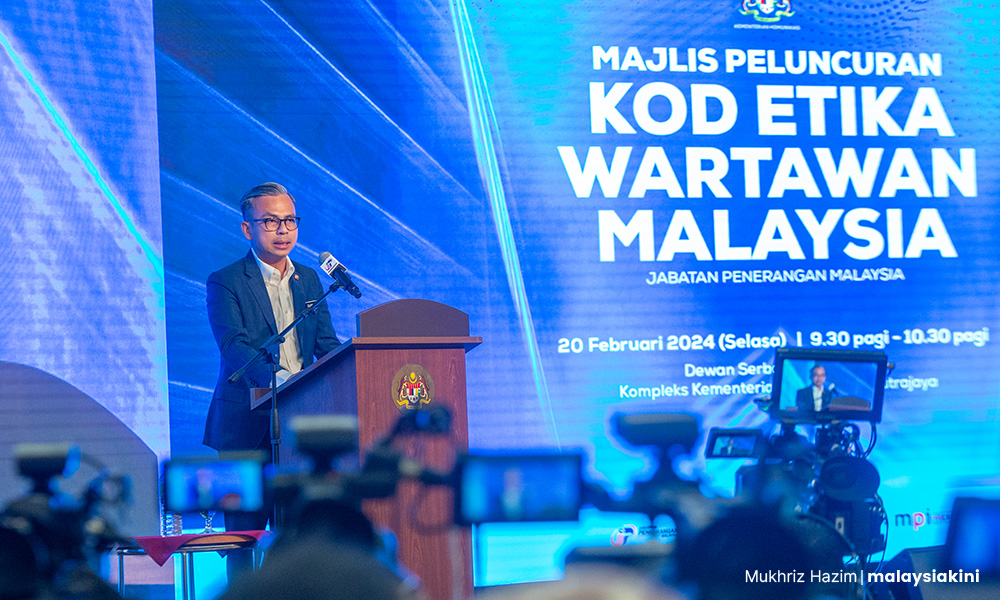Local and regional press freedom advocates have taken the government to task over a recent move to issue media cards with significantly shorter validity for multiple online media journalists from various news agencies.
National Union of Journalists Peninsular Malaysia (NUJM) general secretary Teh Athira Yusof said the move goes against the government’s pledge to uphold press freedom.
“In its promise to expand the media industry to be more inclusive, this action by the ministry is seen as a step back.
“We are making this call to ensure the welfare of the journalists are protected when they are carrying out their duties as the fourth estate,” she said in a statement today.
Malaysiakini previously reported that several online journalists received media cards that only had six-month validity, while others, including several Malaysiakini journalists, were given cards with one-year validity.
This is significantly shorter than the standard two-year validity for media cards issued to local media and contradicts the policy stated on the Information Department website.
Earlier today, a source from the Information Department said it is in the process of reviewing standard operating procedures (SOP) for issuing media cards.
This follows an instruction from Communications Minister Fahmi Fadzil during the launch of the Information Department’s Media Code of Ethics on Feb 20.
Commenting further, NUJM urged the government to consider reverting to the standard two-year period of validity when issuing media cards for all media practitioners without prejudice.

In calling for transparency surrounding the ongoing review, Teh Athira said fresh restrictions would hinder journalists from carrying out their duties at government facilities.
"It seemed like, the more we ask for press freedom, the more they try to control and take it back in other ways," she stressed.
‘Air of uncertainty’
The Center for Independent Journalism also questioned the lack of transparency over the Information Department’s review process.
CIJ executive director Wathshlah Naidu said the recent development has created an “air of uncertainty” for online media practitioners, with a ripple effect on the integrity of information received by media consumers.
"What are the criteria for review? There has so far been no transparency.
“Will there be an appeal mechanism? Ultimately, the move impacts not only media practitioners but also the public’s rights to make informed decisions,” she told Malaysiakini.
Not the case in Indonesia, Thailand
Around the region, press freedom groups from Indonesia and Thailand said government-based media accreditation was abolished as part of the countries’ institutional reforms.
Indonesia’s Aliansi Jurnalis Independen (AJI) secretary-general Ika Ningtyas said a requirement for government media accreditation and publishing licences - a relic of former president Soeharto’s authoritarian New Order era - was abolished in 1999 through the enactment of a new press law.
“Media publishing licences were effectively misused to control the media.
“At that time, media licences were easily revoked if the media criticised the government,” she told Malaysiakini.
She said the current practice in Indonesia is for media companies to issue journalists with their identification tags, while the Press Council carries out independent verification and accreditation, and functions as a self-regulating platform.
“So in principle, media freedom should not be controlled through administrative requirements, which in the end can be misused to censor the media,” she added.

Former Thai Journalists Association vice-president Teeranai Charuvastra said there is no accreditation for domestic media in Thailand due to concerns that government agencies may abuse the system to restrict selected media outlets.
"This arrangement has proved to be invaluable to Thailand's basic press freedom so far.
“For this reason, a proposal made in 2017 by the military government at the time to introduce a media accreditation system was eventually dropped after massive opposition from various groups, including the Thai Journalists Association.
“While the Department of Public Information does issue government-certified ‘press cards’, they are mostly for media workers who wish to attend state events or royal ceremonies, and they are not a requirement in any legal sense,” he said, adding that a majority of Thai media workers does not own a press card. - Mkini



No comments:
Post a Comment
Note: Only a member of this blog may post a comment.